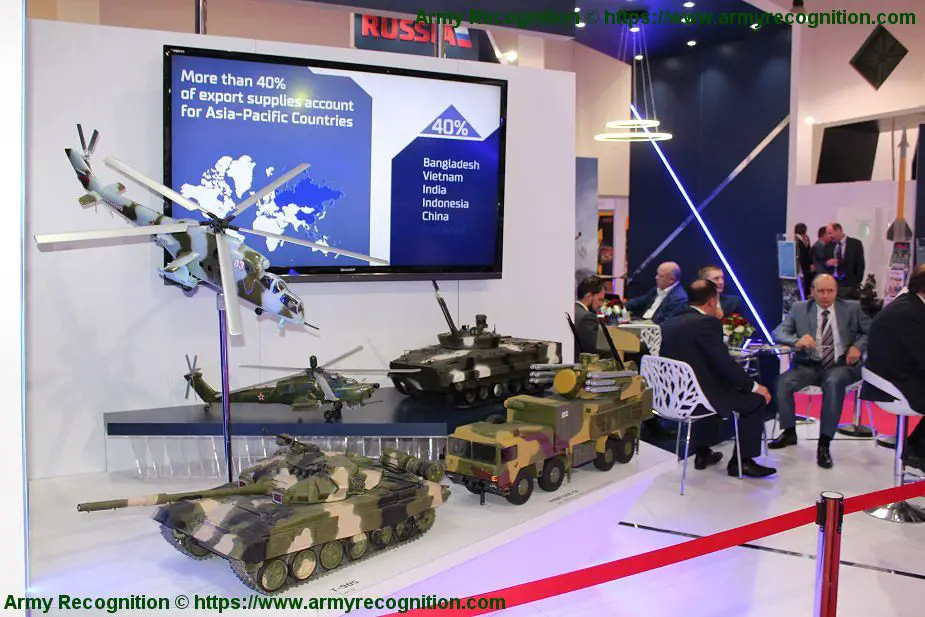Breaking news
Russia arms export in 2019 has reached around USD15 billion.
Russia exported arms to the tune of USD15 billion in 2019, President Vladimir Putin said at a teleconference of the Committee on Military-Technical Cooperation with foreign states (KVTS) on April 9, 2020.

Russian State Company Arms Export Rosoboronexport booth at a defense exhibition in Kuwait. (Picture source Army Recognition)
“When it comes to last year’s results in the field of military-technical cooperation, one can describe them as positive. Despite unfavorable environment and harsh backlash of our competitors, the military-technical cooperation system was functioning in a well-organized manner. Not only did we implement our program, but we also exceeded the planned figures by 2%. The items of military hardware worth USD15 billion were exported, and the volume of backlog of orders [for defense systems] has exceeded USD55 billion. More than 100 countries are on the list of our partners [for military-technical cooperation],” said Putin.
According to him, the summit ‘Russia-Africa’, which had been held in October 2019, gave a good impetus to the development of military-technical cooperation. “Contracts to the tune of approximately USD1 billion have been signed with African countries,” said Putin.
“The positive experience of the combat use of Russian weapons, particularly, in Syria is also to our benefit. Their [combat] effectiveness, accuracy, reliability, and easiness of maintenance are among the qualities that drive the demand in the global arms market. I am confident that the Russian systems will retain their [market] competitiveness and being in demand. The systems’ unique features and specifications, as well as cutting-edge technologies, are the premises for this [demand],” Putin concluded. According to him, the maintenance of Russia’s position as a top arms market player will require flexible and well-timed alterations of military-technical cooperation methods.
During the teleconference, the President also heard the reports of top defense enterprises’ executives.
According to Director Executive of the Tula-based Instrument Design Bureau (KBP) named after A G Shipunov (a subsidiary of Rostec’s holding High-Precision Weapons) Dmitry Konoplyov, KBP works with 14 countries and implements 43 contracts. “There are four newly signed contracts, and we are waiting for their ratification and initial payments. We have hammered out the financing of these contracts with banks, and subcontracts with the members of the supply-chain network are now being signed. The risks have been minimized, we reckon,” said Konoplyov.
JSC VPK NPO Mashinostroyenia (a subsidiary of the Tactical Missiles Corporation, KTRV) maintains cooperation with its parent company, regional authorities, members of the supply-chain network, and Ministry of Defense’s (MoD’s) departments, with which the enterprise does business, said the company’s First Deputy Director General — Deputy Designer General Alexander Dergachyov. “All the tasks set by the State Defense Order [Gosoboronzakaz, GOZ] and the military-technical cooperation program will be fully accomplished in time,” noted Dergachyov. “We conduct serial deliveries in all possible cases. For instance, the share of active workers at the NPO Strela plant in the Orenburg Region reaches 90%,” he added.
According to Director General of the holding Russian Helicopters (a subsidiary of state corporation Rostec) Andrey Boginskiy, a company’s main asset, the Rostov Helicopter Plant (Rostvertol), is continuing its work to implement the GOZ and programs of military-technical cooperation to the full extent. “The Rostvertol’s maximum productive capacities exceed the plant’s orders under GOZ and military-technical cooperation. The enterprise therefore is capable of full implementation of both programs, if the components are delivered in time,” said Boginskiy. He added that Rostec, the Russian Helicopters, and the holding’s subsidiaries had created emergency response centers to coordinate their activities with the Ministry of Industry and Trade (Minpromtorg), the parent company, and the regions.
According to Director General of the United Aircraft Corporation (UAC; the corporation is controlled by Rostec) Yury Slyusar, the UAC is also working on the maintenance of its supply-chain network. “At this stage, we do not see any risks threatening the implementation of the GOZ and the contracts of the military-technical cooperation program,” said Slyusar.


























